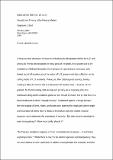Security and Privacy: Why Privacy Matters
Author(s)
Bird, Stephanie J
Download11948_2013_9458_ReferencePDF.pdf (34.37Kb)
PUBLISHER_POLICY
Publisher Policy
Article is made available in accordance with the publisher's policy and may be subject to US copyright law. Please refer to the publisher's site for terms of use.
Terms of use
Metadata
Show full item recordAbstract
A long-overdue discussion of security and privacy is taking place within the US and among its friends and associates in many parts of the globe. In large part, this is due to the revelations of Edward Snowden, the employee of a government contractor, who leaked secret information about the extent of US government data collection on the calling habits of US residents. Privacy is often pitted against security, thereby creating a false dichotomy that is a discussion for another time. However, if it is granted, for the time being, that security and privacy are at opposing ends of a continuum along which a balance point can and should be found, that is, that there is a theoretical point at which “enough security” can be balanced against “enough privacy”. How is the balance attained? Those who are concerned about security have a point: the tragedy of victims' lives, hopes, and futures torn apart by the misplaced violent anger and frustration of terrorists or other criminals clearly elicits an immediate and deep-seated, visceral response, and underscores the importance of security. But does security outweigh or even trump privacy? More importantly, should it?
Date issued
2013-07Department
Massachusetts Institute of Technology. Office of the ProvostJournal
Science and Engineering Ethics
Publisher
Springer Netherlands
Citation
Bird, Stephanie J. “Security and Privacy: Why Privacy Matters.” Science and Engineering Ethics 19, no. 3 (July 27, 2013): 669–671.
Version: Author's final manuscript
ISSN
1353-3452
1471-5546